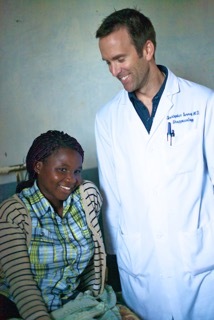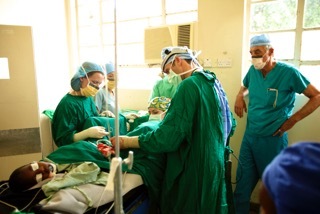Fistula occurs as a result of a birth or obstetric injury. It rarely happens in the United States because when there's an obstructed labor that could cause fistula, the baby is delivered by cesarean section.
But in remote African villages, women can be hours, perhaps days away from a hospital. During a long and difficult labor, especially with a large baby, a hole can develop between the bladder, rectum (sometimes both) and the birth canal that allows urine and stool to leak uncontrollably. In 80 percent of these cases, the baby dies.
Dr. Christopher Tarnay directs the division of pelvic medicine and reconstructive surgery at UCLA, California. He's also one of the few surgeons in the world who can repair complex fistula.
These women and girls are ostracized by their communities. The smell around them is so bad that they are banished from their homes. This operation is life-changing for them. They never complain, but endure tremendous pain and hardship with grace and resilience. We help women whose lives have been ruined because of fistula.
Dr. Tarnay has been taking volunteer medical teams from the United States to Uganda for five years with Medicine for Humanity and was recently appointed the charity's medical director.
Medicine for Humanity, established twenty years ago by Dr. Leo Lagasse, pays for a radio broadcast urging women who suffer from incontinence of stool or urine after childbirth to come for treatment. Word soon spreads and women arrive at the clinic on foot and by bus the day before the medical team gets there. At first the women are sad and traumatized because of this debilitating condition. They leave smiling for the first time in years.
Married at 15, pregnant at 16, Sanini's baby died during a long and difficult labor. The resulting fistula from the traumatic birth caused Sanini's husband to leave her. One week after the operation to repair the debilitating condition, Sanini is pictured above with Dr. Tarnay who she credits with making her life now worth living again.
"We can take care of 50 women in two weeks, working from sun up to sun down. My goal is to not be needed because we've trained enough local medics to take over fistula repair," said Dr. Tarnay.
He and his team take everything necessary to build the camp, including medical equipment and medication. And they provide accommodation, food and water for patients and their carers (who can be family members as young as 10).
Medicine for Humanity's mission is to improve the health of women in under-served populations, bringing medical care and creating sustainable programs of education, prevention and treatment.
It takes 3-4 months of intensive training for someone who is already a surgeon to be able to repair a fistula because it's so complex. Medicine for Humanity has trained three doctors in fistula care so far in Uganda. Dr. Tarnay estimates there are currently two million women in the world with untreated fistula and 20,000 untreated cases in Uganda.
With only 22 medics in Uganda (they're not even all doctors) who can manage fistula and around 2,000 new cases there a year, they can't keep up with new cases let alone help women who have been enduring fistula for sometimes thirty years.
"If we don't go, these women don't get taken care of," said Dr. Tarnay.
